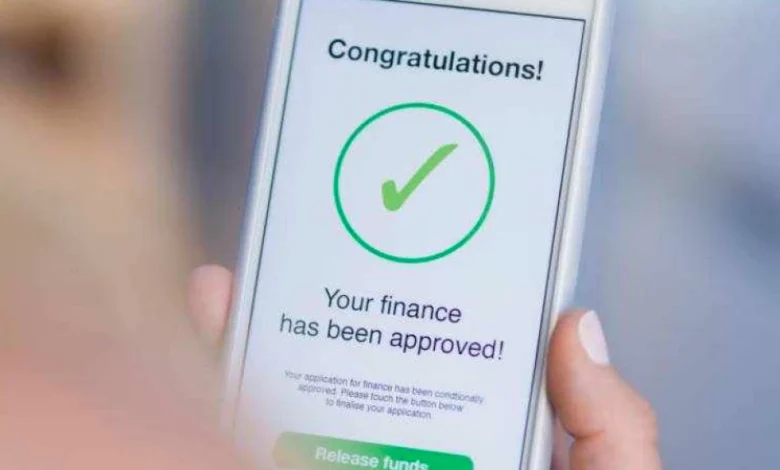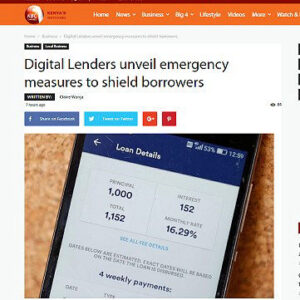How Mobile Loan Apps Are Pushing Desperate Kenyans to Depression
Heart-Wrenching Stories of Kenyans Trapped by Mobile Loan Apps. Unscrupulous Lenders Exploiting Regulatory Gaps and the Desperation of Borrowers.

Nairobi, August 2024 – In a frantic effort to save her four-year-old son who had swallowed a five-shilling coin, Grace urgently downloaded a mobile loan app she had heard about from her fellow grocers. She quickly filled in her personal details and agreed to the terms without reading them. At the local health facility in the crowded streets of Baba Dogo in Nairobi’s Mathare slums, doctors required 1,500 shillings before they could begin emergency treatment to save her son’s life.
Although Grace was approved for a 1,500-shilling loan, she received only 1,050 after a steep 450-shilling deduction, which she assumed was for upfront interest. She quickly borrowed the top-up amount from her friend who had accompanied her to the hospital that dreadful afternoon. Later, Grace learned that she had to repay the entire 1,500 shillings within seven days— about 43% more than what she had borrowed.
But the worst was yet to come. On the sixth day, Grace woke up to a barrage of harassment—missed calls, threatening messages, and relentless pressure to repay the loan, even though she knew she had one more day. KeCredit’s aggressive debt collectors harassed her incessantly, denying her any peace at home or work. After numerous failed attempts to negotiate more time for repayment, she was forced to block several numbers and switch off her phone just to find a moment of peace.
“The calls and texts were overwhelming, with threats of drastic action if I didn’t repay within an hour. They nearly drove me to depression,” Grace says. “If it weren’t for my son’s emergency, I would never have subjected myself to such terrifying stress.”

Grace’s ordeal is far from unique. Her story is just one among hundreds of others ensnared by predatory mobile lending apps. Our team spoke with dozens of borrowers trapped by these companies, uncovering a pattern of widespread exploitation and distress. These lenders exploit borrowers’ vulnerabilities with aggressive and unethical tactics.
Many reported being hit with exorbitant interest rates and hidden fees, pushing repayment amounts far beyond what they initially expected. They also raised concerns about the misuse of personal data, alongside harassment and threats, turning what should be a lifesaver into a nightmare.
Digital lending apps request access to users’ private information—contacts, text messages, location, and calendar—upon installation. While this data is intended for evaluating loan eligibility, unscrupulous lenders misuse it when borrowers default, leading to severe consequences.
To fully understand the borrowers’ ordeal, one of our team members decided to step into their shoes. From Google Play, he downloaded three apps—KeCredit, Ipesa, and KashWay—on different dates, each claimed by our sources to be notorious for aggressive debt collection practices, including debt shaming and harassment of defaulters and their contacts.
Despite his “good credit score” qualifying him for larger loans, he chose the smallest amounts with the shortest repayment periods—seven days at most—determined to experience the grind firsthand. What he encountered was a relentless nightmare. Like Grace and over 200 others who bravely shared their harrowing stories with us, our journalist was subjected to a barrage of humiliation and dehumanization.
In just two days, he was bombarded with over 1,000 calls and harassing messages from more than 60 different numbers, some arriving well past midnight and as early as 5 am, illustrating the brutal reality of these predatory lending practices. The messages ranged from insults to threats of sharing personal details with his employer, friends, and family or listing him with the Credit Reference Bureau (CRB).

“The relentless barrage of angry calls and texts felt like they were on autopilot,” our reporter says.
When he spoke to three different callers from KeCredit, Ipesa, and KashWay, they all used the same intimidating and demeaning language. Our reporter, for the purposes of this article, borrowed 1,500 shillings from KeCredit but received only 1,050 after deductions.
From Ipesa, he requested 4,300 shillings and was credited with 3,456. For KashWay, he asked for 3,300 shillings and got 2,376. The required repayments were 1,500 shillings to KeCredit, 4,800 shillings to Ipesa, and 3,300 shillings to KashWay, all due within seven days of disbursement.
All three lenders have under their FAQ identical loan interest terms that vaguely mention, “a minimum origination fee of 12% is charged for a 180-day term,” however, the apps dictate the terms, with no flexibility for the borrower. This suggests that the true interest rates and total repayment amounts are between 39% and 43% higher than advertised under their terms and conditions, with additional undisclosed charges. Credit experts consider these rates to be steep and exploitative.
Our reporter pressed the callers about the actual interest rates they applied and sought explanations for why their debt collection practices, which included harassment and unethical behavior, did not align with data protection laws and the Central Bank’s regulations against such aggressive tactics.
“Stop asking me those silly questions. Pay our loan, or you’ll never know peace,” snapped one caller named Mercy. Another caller, Gerald, threatened, “We have your family’s, employer’s, and friends’ details. We’ll expose your private life and embarrass you if you don’t pay up now. You’ve 30 minutes to pay.”
The calls and messages continued to flood in, each one more urgent and furious with every passing minute.
Regulatory Context and Challenges
The Digital Financial Services Association of Kenya (DFSAK) and the Office of the Data Protection Commissioner (ODPC) announced in May this year that harassment and shaming by digital lenders had decreased by up to 75% following stringent rules introduced by the Central Bank of Kenya (CBK) two years ago.
These regulations require digital lenders to obtain licenses and comply with specific consumer protection standards, including fair interest rates and ethical debt collection practices. However, the situation seems to be worsening once more, or perhaps it never truly improved.
Previously, digital lenders employed tactics such as sending debt collection agents to contact borrowers’ friends and family or threatening to report their loan status to their employers.
According to ODPC Immaculate Kassait, sharing personal details or calling the friends or family of loan defaulters is illegal under Kenyan law. Lending firms are authorized only to disburse funds to the loan applicants, not to their relatives or acquaintances.

Despite these regulations, enforcement remains a significant challenge. As of July this year, the CBK had licensed only 58 digital credit providers, with 480 applications still pending review. However, unlicensed or unethical lenders continue to operate, exploiting regulatory gaps and the desperation of borrowers.
Kassait says that over 1,000 service firms, including digital lenders, educational institutions, hospitals, and telecommunications companies, are under investigation for privacy violations, with most complaints centered on the misuse of creditor data by digital lenders.
The Data Protection Act, effective since November 25, 2019, imposes fines of up to 5 million shillings or 1% of annual turnover for breaches.
Last September, Mulla Pride Ltd was fined 2.97 million shillings for such violations. KeCredit, once operated by Mulla Pride Ltd, is now under Azura Credit Limited, while Ipesa and KashWay, previously managed by XGO Kenya Limited, linked to a Chinese entrepreneur, have repeatedly faced scrutiny for unethical practices.
The Impact on Borrowers

Borrowers also voiced concerns about the need for increased scrutiny of the platforms used by unlicensed lenders, including mobile money platforms run by telecommunications companies where these transactions occur. Despite Google’s policies prohibiting loan apps with repayment periods shorter than 60 days and those providing “deceptive” or “harmful” financial services, some apps flagged for predatory lending practices are still accessible on Google Play.
In a country where many lack access to traditional banking, digital lending fills a crucial gap by offering fast, mobile-based credit. This widespread mobile technology helps extend financial services to the unbanked, supporting financial inclusion and economic growth.
Over 80% of Kenya’s adult population uses mobile money services, making digital loan providers a crucial source of credit for those who cannot access traditional bank loans. Data from DFSAK reveals that digital lenders in Kenya serve around eight million customers, disbursing short-term loans totaling between Sh10 billion and Sh15 billion each month.
However, with rising concerns about data and financial exploitation, individuals like Grace and many others fear that without stronger borrower protections, these apps may drive desperate Kenyans deeper into depression.